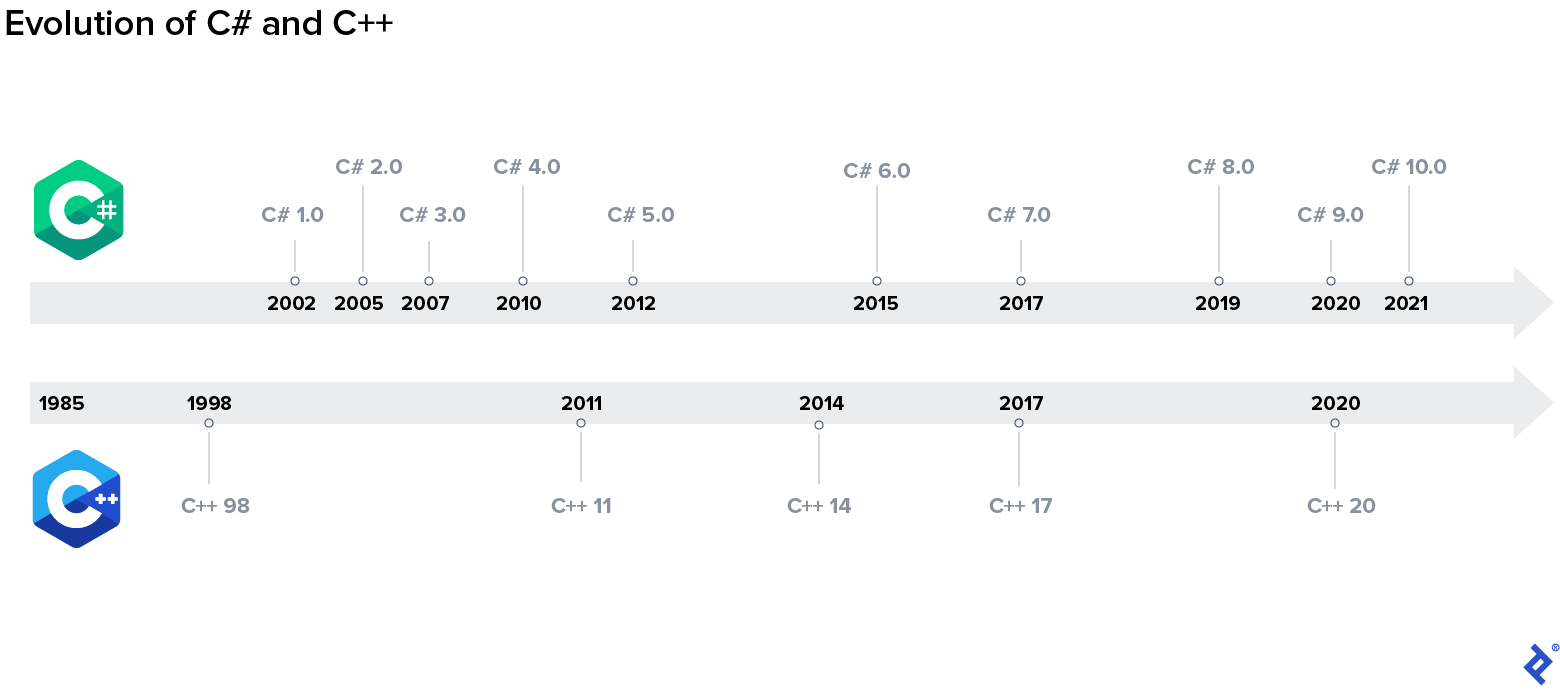C# vs. C++: What’s at the Core?
C# and C++ share a similar syntax but cater to different requirements, so which should you focus on? This article examines each language’s features and weighs the pros and cons.
C# and C++ share a similar syntax but cater to different requirements, so which should you focus on? This article examines each language’s features and weighs the pros and cons.
Jakiša is a veteran full-stack developer with more than 15 years of experience creating C# and C++ apps on multiple platforms. His portfolio includes work with the Windows API, embedded programming, distributed systems, mixed reality, and DevOps. Jakiša has a master’s degree in mathematics and computer science from the University of Zagreb.
PREVIOUSLY AT

In the fast-paced and evolving world of software engineering, different programming languages are vying to earn their place in the industry. However, different languages use different paradigms and tend to have long lists of pros and cons, making direct comparisons between them challenging and inconclusive.
Some languages, though, have similar syntax and focus, so it makes sense to compare them side by side. In this article, we examine the difference between C++ and C#, and compare these prolific programming languages.
A Brief History of C# and C++
In the 1970s, as Danish computer scientist Bjarne Stroustrup worked on his PhD thesis, he wanted to use Simula, the first object-oriented programming language. But Simula proved to be too slow so Stroustrup decided to use C, which was—and some would say still is—the fastest programming language.
After his experience with Simula, Stroustrup started developing an object-oriented language based on C, and by 1985, C++ was made available to the public.
He decided to make C++ “as close to C as possible, but not closer,” meaning that adoption would not be an obstacle. Because all C libraries were automatically available for use, many top C developers were able to switch to C++ by building on top of their existing knowledge.
Unfortunately, the innate similarity to C was also one of the weakest points of C++, as both languages required steep learning curves and were difficult to master, which made coding a challenge for inexperienced developers.
That was one of the key reasons behind Sun Microsystems’ decision to create Java in the mid-’90s. Java had syntax that was similar to C++ but it simplified language constructs and reduced the chances of unintentional mistakes. The Java team, headed by James Gosling, accomplished this mainly by dropping backward compatibility with C.
In 2002, Microsoft released C# as a direct competitor to Java. As an alternative language, C# shares some syntax with Java but has more features. Both C# and C++ have been improved significantly since their release.
Object-oriented Programming Languages With a Caveat
When C++ appeared, the majority of programming languages were procedure-oriented.
In procedural programming languages, a program is organized in smaller units, called procedures. Each procedure corresponds to some common action that is used later (called from) in a bigger unit.
In object-oriented languages, procedures are grouped around the objects on which they are performed. An object is a logical unit that holds some state.
C# is a fully object-oriented language, while C++ is a language that can mix procedural and object-oriented code.
Similarities Between C# and C++
Both languages are object-oriented and based on C. Moreover, C# is based on C++, which makes them quite similar. Those not fluent in either language could easily mistake one for the other by glancing at the code.
Both languages feature traits commonly found in object-oriented languages, including:
- Encapsulation. Code is organized in logical groups, called classes.
- Data hiding. Parts of data and code are private, which means that they can only be accessed from within a class.
- Inheritance. Shared class functionality can be organized in a common class inherited by derived classes, and therefore avoid code duplication.
- Polymorphism. Code is able to affect an object of the base class but behaves differently for different derived classes.
Differences Between C# and C++
Some powerful features of C++ are difficult to understand and can cause programming errors. These features were intentionally omitted in Java and subsequently in C#:
- Multiple inheritance. Derived classes inherit multiple base classes. Instead of this feature, C# introduced base classes without implementation. Such classes are called interfaces in C#.
- Pointers. While pointers can be used in C#, code that uses pointers has to be marked as “unsafe.” This practice is highly discouraged and references are used instead.
- Loss of precision. C# does not allow loss of precision by implicit type conversion. If precision is about to be lost, explicit conversion is required.
Memory Management
Perhaps the most crucial difference between C# and C++ is memory management.
In C, dynamic memory (i.e., memory allocation is not known in advance) is allocated using the malloc function and deallocated using free. Programmers were expected to manage memory manually. As a result, memory leaks were common errors in C code.
Memory management in C++ is improved, as memory is managed semi-automatically. Objects called “smart pointers” can be used so programmers don’t have to deallocate memory manually. However, there are some edge cases (circular references) where smart pointers are insufficient to prevent memory leaks.
C# uses a garbage collector (GC), which automatically deallocates memory that is no longer used. While this might seem ideal, sometimes GC makes it challenging to deallocate an object that holds system resources other than memory (e.g., file handles or TCP connections). In that case, a phenomenon known as “resource leak” can occur, and the programmer must manually deallocate the object that holds resources. In these rare situations, deallocation in C# becomes more complicated than in C++, as the destruction of objects in C# is not deterministic.
Compilation: Binaries vs. Bytecode
C++ is compiled into machine binary code immediately. C# is compiled into bytecode that is later compiled into machine binary code by .NET. (Previously “.NET Core,” .NET is Microsoft’s modern, cross-platform replacement for the original .NET framework.)
Although C++ has a performance advantage in these different approaches to compilation, C# has a powerful feature called “reflection,” which enables object instantiation and method invocation with the information gathered in the run time. For example, one may call a method by its name, although that method wasn’t available during the compile time. C++ cannot have reflection, by definition, as it is compiled immediately. C++ has run-time type information (RTTI) instead. This is a much less powerful feature because it is used only for types with virtual functions.
C++ also has templates in the form of code that generates at compile time depending on the types of variables. Instead of templates, C# has generics. Generics are not resolved at compile time, but at run time. As such, templates are faster than generics. On the other hand, generics don’t require additional memory for each new variable type.
Feature Comparison
| Feature | C++ | C# |
|---|---|---|
| Compilation | Directly to binary | To bytecode |
| Compilation time | Long | Short |
| Memory management | Manual or semi-automatic by smart pointers | Automatic by the garbage collector |
| Run-time speed | As fast as possible | Slower than C++ |
| Run-time memory requirements | Optimal | More than C++ |
| Error-prone | Error-prone for unexperienced programmers | More Beginner-friendly |
| Class inheritance | Single, multiple, and virtual | Single only, multiple with interfaces |
| Generic code | Templates — compile time | Generics — run time |
| Portability | Compilers available for virtually all operating systems, but code needs to be compiled for every target | Compiled bytecode can run on many operating systems |
| Learning | Steep learning curve; time-consuming; can be complex for novice developers; smaller community with fewer learning resources being produced | High-level language; easier to read; superior class hierarchy; easier to master for beginners, especially those with C++ or Java experience; larger and more active community |
| Reflection | Unavailable, run-time type information is a poor replacement | Available and very convenient |
| Implicit conversion | Permissive for built-in types | Allowed only if safe |
| Compatibility with C | Fully compatible with extern C code | Not compatible |
| Modularity | Accomplished with libraries and headers | Built into the language |
C# vs. C++: Which Language Is Better?
When it comes to speed and memory efficiency, C++ is the clear winner. However, if a good C# library is readily available but no such library is available for C++, C# could ultimately yield a faster solution, and C++ implementation may turn out to be slower.
Development is usually faster in C#. If the application doesn’t perform time-critical tasks, it makes sense to choose the easier and less error-prone language.
Traditionally, C++ was the right choice for a non-Windows environment, but that changed once Microsoft started encouraging open-source implementations of .NET. The same C# bytecode can run on virtually any platform, which makes it the language of choice when it comes to simplifying portability.
Due to reflection, C# is the more reasonable choice when writing libraries that have to support remote function calling or similar features that require code generation using information available at run time.
Although both languages support modular design, it is harder to maintain in C++, which implements that feature using headers designed in C—a method that is now surpassed by more modern approaches. This usually results in a C++ compilation time that is significantly longer than the compilation time of C# to bytecode.
C++ is a more complicated language, so C++ programmers can shift more easily to C# than vice versa. But if your team contains both C++ and C# developers, it is possible to mix the two languages.
Choosing the Right Language
If you need high performance, the answer is C++ in almost all situations. “High performance” refers to code. If you are using readily available libraries for time-critical work, the performance of your code may not be a decisive factor.
If performance is not critical, the development time is something to consider. If you can start from scratch, developing your project in C# is probably the better choice.
If you have some development time to spare but performance is not critical, the choice depends on the skills of the available developers. Keep in mind that your developers’ fluency may seriously impact future code maintenance. Whenever possible, consider the language your team prefers.
Further Reading on the Toptal Blog:
Understanding the basics
Why is C++ useful?
C++ is a highly optimized object-oriented programming language that is used in environments where time and memory-critical operations are needed.
Why is C# used?
C# is used in scenarios where rapid and less-error-prone development is needed.
What is the difference between C++ and C#?
C++ is faster and has a smaller memory footprint, but C# is easier to learn and is less error-prone than C++.
Zagreb, Croatia
Member since November 13, 2019
About the author
Jakiša is a veteran full-stack developer with more than 15 years of experience creating C# and C++ apps on multiple platforms. His portfolio includes work with the Windows API, embedded programming, distributed systems, mixed reality, and DevOps. Jakiša has a master’s degree in mathematics and computer science from the University of Zagreb.
PREVIOUSLY AT



